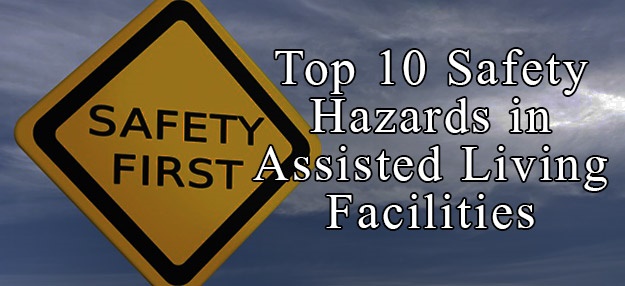
One of the most common reasons families decide that aging loved ones are better off in an assisted living facility than in their own homes is safety. Unless a family can afford a private nursing team, or an in-home agency for round-the-clock care, assisted living facilities and nursing homes typically afford greater safety for seniors with chronic health problems than living alone.
Unfortunately, there are still safety hazards present in many assisted living facilities and nursing homes. This article discusses some of the most prevalent safety risks to seniors in residential care facilities and what steps families and friends can take to help their elderly loved ones safe.
1. Lack of Safety Alert System
Most modern assisted living facilities and nursing homes have safety alert systems that allow residents to call a nurse in the event of an emergency. Bathrooms should be equipped with an emergency pull string, and every bed should have a call button nearby. Before placing your loved one in an assisted living facility, ask to see a demonstration of their safety alert system. These systems can help prevent falls and ensure that your loved one receives prompt attention from facility staff in the event of an emergency.
2. Poor Lighting in Living Areas
The leading cause of injury to seniors in assisted living facilities is falls. Make sure that the lighting in your loved one’s living areas is neither too dim or too bright. Dim lighting can lead seniors to trip over obstacles and fall. Lighting that is too bright is just as dangerous – it may obscure hazards that cause elderly people to get hurt. If you have concerns about the lighting in your loved one’s facility, speak with a manager about options to improve the situation. The fix may be as simple as placing an additional lamp in the room or changing a light bulb.
3. Improper Administration of Medications
The more medications a senior takes, the greater the risk of a dangerous pharmaceutical interaction or overdose. Make sure that your loved one’s assisted living facility or nursing home is aware of all the medications he or she takes, including over-the-counter drugs. Top-quality facilities will have a highly organized method for administering medications. Many residential care facilities put daily doses of medications in sealed packets and cross-reference them to a medication list before administering them to senior residents. Don’t be afraid to ask about a facility’s procedures for administering medications before placing your loved one there.
4. Obstructed Walkways
Obstructed walkways pose significant dangers to seniors, especially those who rely on a cane or walker to get around. Each time you visit your loved one in an assisted living facility or nursing home, check to make sure that he or she has a clear path to the bathroom and to common areas. Help your loved one keep his or her space organized, and make sure that clutter does not accumulate on the floor.
5. Chairs without Armrests
Many seniors struggle to get up from a seated position. Chairs without armrests present a serious risk of falls. Make sure that the chairs in your loved one’s living area, dining area, and other common areas have arms. If your loved one is on the shorter side, pay careful attention to seat heights as well. You may want to speak to a facility manager about obtaining smaller chairs that he or she can get in and out of easily.
6. Inadequate Handrails in Bathrooms
Grab bars and handrails in bathrooms are essential safety measures in residential care facilities. Before placing your loved one in an assisted facility or nursing home, make sure that there are handrails near the toilet and grab bars in the shower or tub. These may need to be adjusted based on your loved one’s height and/or physical limitations.
7. Carpets and Floor Coverings in Poor Condition
Poorly maintained flooring surfaces are a leading cause of falls in nursing homes. Do not place your loved one in a residential care facility that is in need of significant upgrades, such as new carpet or linoleum flooring. Carpet in assisted living facilities should be clean and in good condition. Carpet should also be low pile – shag or high pile carpeting increases the likelihood that someone will trip and get hurt. Rugs should be used sparingly (if at all) in residential care facilities. Seniors are prone to trip on rugs that are loose or not properly secured.
8. Resident Abuse
Sadly, nursing home abuse poses a serious risk to seniors in residential care facilities. Before you place your loved one in a nursing home or assisted living facility, do your research. Visit the website for the agency in charge of nursing homes in your state to see if there is a history of complaints about the facilities you are considering. You may also want to conduct an Internet search to see if any news stories or consumer reviews suggest a history of nursing home abuse at the homes you are evaluating. Ask each facility for references, and interview facility directors about how they handle allegations of abuse. If you suspect that your loved one has been abused in a residential care facility, take immediate action. Contact law enforcement or an experienced nursing home abuse lawyer.
9. Infections
Each year, tens of thousands of nursing home residents contract antibiotic-resistant infections. Two out of every three patients in nursing homes require at least one course of antibiotics regularly. Be sure that your loved one’s nursing home or assisted living facility takes the threat of infection seriously. Common sources of infections are pressure sores, urinary catheters, and contagious diseases like pneumonia. Never visit your loved one if you are sick. Wash your hands thoroughly whenever you visit your loved one in a residential care facility, and encourage your loved one to wash his or her hands regularly.
10. Poor Security
Residential care facilities must take special precautions to secure their premises. Assisted living facilities and nursing homes should monitor their facilities by video, require that visitors present photo identification upon check-in, and have adequate security measures in place to make sure that residents do not leave the facility on their own. Because wandering off is a risk of Alzheimer’s disease and dementia, residents suffering from these diseases should not have access to unlocked exits. Be sure that your loved one’s facility has security procedures in place in case of emergency.
Article submitted by Michael McQuinn, Owner of The Manor of Marston Lake, 4800 Old S. Wadsworth Blvd Littleton, CO 80123 (303) 932-9808.


Comments